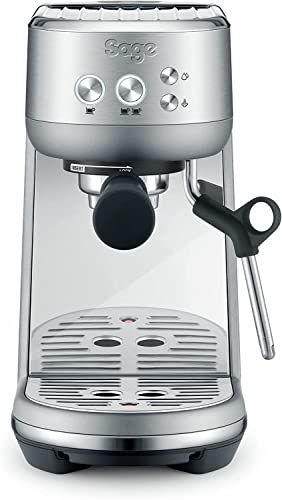What to Look For in a Commercial Espresso Machine
There are a variety of things to take into consideration when buying an espresso machine for commercial use. The kind of espresso machine ideal for your establishment will depend on the quantity of use, the purpose, and barista's abilities.
Double boiler systems allow you to brew while steaming. espresso machine uk decreases the time between pulls. Proportional-integral-derivative (PID) temperature control manages on/off cycles for optimal boiler temperatures.
Productivity
A commercial espresso machine is designed to handle a much larger amount of coffee than a home espresso machine. Expecting a domestic espresso machine to work in a professional setting would be an unintentional recipe for disaster.
A commercial machine that is of high quality will be able to serve up to 100 coffee cups per hour at peak times. This can be a great help in busy offices, as it will stop employees from having to wait around to get their coffee.
A coffee machine can also aid workers in bonding. Oftentimes teams of people will make a habit of getting coffee, and this can foster collaboration and teamwork in the workplace. A dedicated coffee area can make new employees feel more at ease in their workplace and break down barriers between them, senior employees and other employees.
Commercial espresso machines are available in various sizes to meet a variety of needs. Some models are fully automated and others are able to pre-program espresso shots so that operators do not have to guess the correct size. This is particularly important for businesses that have untrained baristas since incorrect shots can alter the intensity and taste of brewed espresso. It is also best to buy commercial espresso machines that are made of ethically sourced materials that benefit the communities in which coffee beans are cultivated. This will guarantee a high quality product and minimize the negative impact on the environment.
Safety
Espresso machines are big machines that weigh a lot that can cost more than a brand new compact car. They're also designed to churn out hundreds of shots and drinks in a day. These high volume operations can create some unique work health and safety risks for workers, so it's important to consider the potential dangers that come with an espresso machine in a commercial setting.
It's important to keep in mind that a commercial espresso machine is likely to operate with warm water, which could increase the growth of bacteria. Inefficiently maintained machines that are not descaled and cleaned regularly can accumulate spent espresso. This could cause it to go rancid, and possibly cause illness when consumed by customers. Commercial espresso machines with steam wands that are not sealed may let bacteria grow in the milk the frothing process.
When deciding on the best commercial espresso machine, it is important to think about the kind of drinks you'll be serving as well as how many cups per hour your space can handle. You should also look for an espresso machine that has automation features, which make it easier and faster to serve your customers your favorite coffee drinks. Look for a warranty which includes both parts and labor. This will ensure that any technical issues are resolved quickly.

Energy Efficiency
Commercial espresso machines require substantially more power than home models. This is due to the fact that professional espresso machines are built with heavier frames and large capacity boilers to support the multiple group heads required for typical cafe production. These machines operate at a higher temperature and are generally located inside (such as in a cafe or restaurant) where the electronic components may overheat.
The boiler of commercial espresso machines heats and holds pressurized drinking water supplied by an electric pump. The water is then used for brewing and steaming espresso. The boiler is made up of a number of copper tubes that are heated by electric elements. When the brew sensor detects that the water level has reached the desired level the solenoid valve is opened and fills the boiler with new water. The heating element is then turned off.
There are four variants of espresso machines, distinguished by their ability to steam and brew: TBS (brewing only), TX (twin boilers) HX, TB, and DA (double automatic). TB and TX machines offer stable brew temperatures, whereas DA can provide rapid steaming using one boiler. HX machines are utilized by many cafes as they offer the best in both brew and steam temperature.
Maintenance
Commercial espresso machines require regular maintenance, just like cars. They must be maintained to work efficiently and smoothly. If you ensure that you keep your machine in good condition, it will give you a better tasting coffee and last longer.
Cleaning your espresso machine is a regular ritual, but it's vital to clean certain components on a greater scale. There's going to be residue from the coffee grounds and milk products inside the machine that could degrade various components over time. Regular cleaning can prevent this and keeps your espresso machine working at to its maximum.
Most commercial espresso machines need descaling every three months. This process involves a few additional steps when compared to normal cleaning. It is recommended to review the manual to ensure that you adhere to all the guidelines. Descaling involves using a solution to dissolves scale from the water tank. You'll need a container to complete this task. In some units you might also require a container to be placed under the coffee spouts. Follow the instructions for your particular model.
A water filter replacement is a different maintenance process. This is something that could easily be overlooked but is essential to keep in mind so you don't build up of mineral deposits. Examine for calcification. It can be difficult to eliminate from the spray head.
